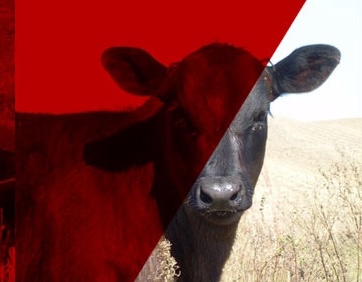Daily energy intake can be a limiting factor for cow performance while grazing winter range or dormant forages. As forages advance in stages of maturity, there is an inadequate supply of crude protein, which effectively limits energy intake and overall intake itself. Intake declines rapidly as forage crude protein falls below about 7%, a relationship attributed to a deficiency of nitrogen (protein) in the rumen, which inhibits activity of the rumen microbes. If the forage diet contains less than about 7% crude protein, feeding a protein supplement generally improves the energy and protein status of cattle by improving their forage intake and digestion. Consequently, cows consuming low-quality forages require additional protein. Protein supplements can be offered to cows daily, three days a week, or as infrequently as once per week and still maintain adequate performance. As a rule of thumb, feeding 0.3 to 0.6 pounds of crude protein per day during late gestation to mature cows maintains cow performance and fetal growth.
Supplemental protein options
Supplemental protein is available in many forms including cakes, grain mixes, blocks, tubs, or forages, and ranges in overall crude protein content. To make it more complicated, due to the rumen and rumen fermentation, not all proteins are created equal. Crude protein can come from natural protein sources, non-protein nitrogen sources (ie., urea or biuret), and frequently a mixture of the two. An additional consideration may be the ratio of rumen degradable protein to rumen undegradable protein. Rumen degradable protein is degraded or utilized by the rumen microbes. Rumen undegradable protein is protected from degradation at the rumen and will be absorbed or utilized by the cow. More information about differences and the importance of each type can be found at https://beef.unl.edu/beefwatch/2022/protein-not-protein-not-protein.
Non-protein nitrogen sources
Non-protein sources, like urea, are generally a less expensive form of protein and utilized in cooked molasses tubs and liquid molasses feeds. Urea works best with high-energy diets that contain crude protein levels below 12 percent. When using poor quality forages, cattle performance can be reduced if urea is supplemented in place of higher quality, natural protein supplements with feedstuffs like dried distillers, soybean meal or cottonseed meal. This is likely the result of insufficient rumen undegradable protein in the diet to meet the actual protein needs of the cow. In addition, urea has a rapid rate of degradation in the rumen, which can result in lack of nitrogen use for forage digestion and result in increased nitrogen (protein) loss in urine. Even slow-release forms of urea (biuret) are usually not effective in improving urea use in forage-based diets due to nitrogen recycling of the rumen and liver.
Developing a protein supplementation strategy
In developing a protein supplementation strategy, it is important to consider what is the goal of feeding the protein supplement and that not all protein sources are equal. For instance, two 30% CP supplements can result in completely different performance depending on both type and percentage of the type of protein in those two supplements. As a reminder, the cow and the rumen microbes both have requirements for protein, which may not be the same type of protein. Research has shown that meeting the rumen microbe requirements for nitrogen first with the remaining portion of crude protein being rumen undegradable can result in increased growth or weight gain, increased reproduction, and increased nitrogen or protein utilization.
If you need assistance with diets or have nutritional questions, Nebraska extension educators and specialists can help. Please give us a call.
Interviews with the authors of BeefWatch newsletter articles become available throughout the month of publication and are accessible at https://go.unl.edu/podcast.

